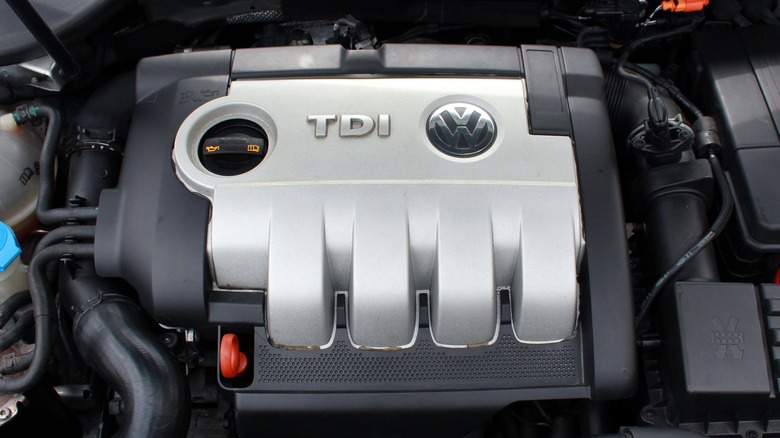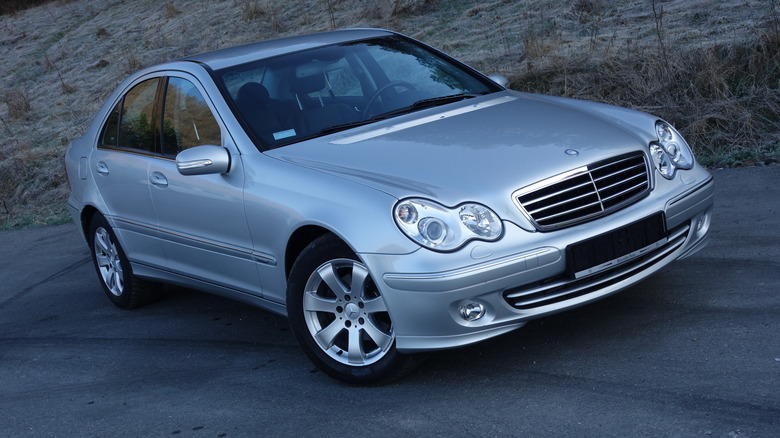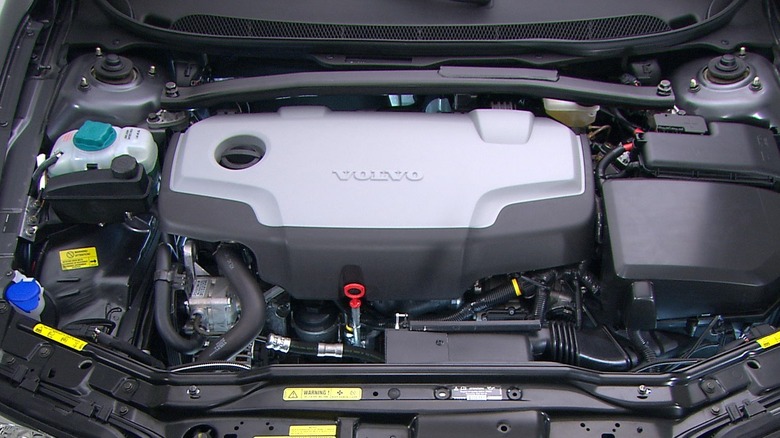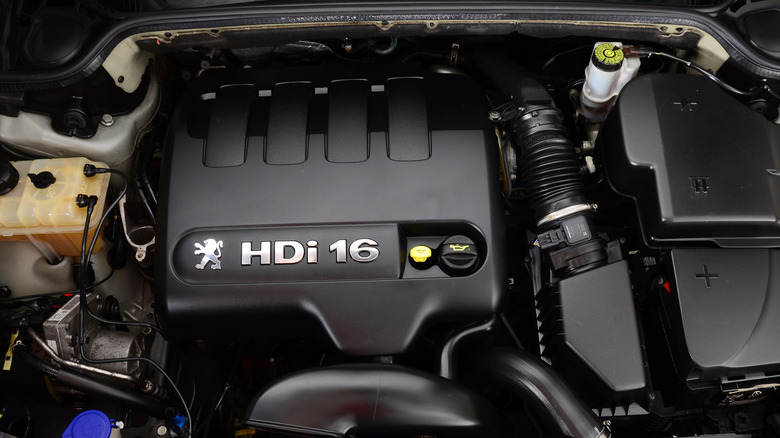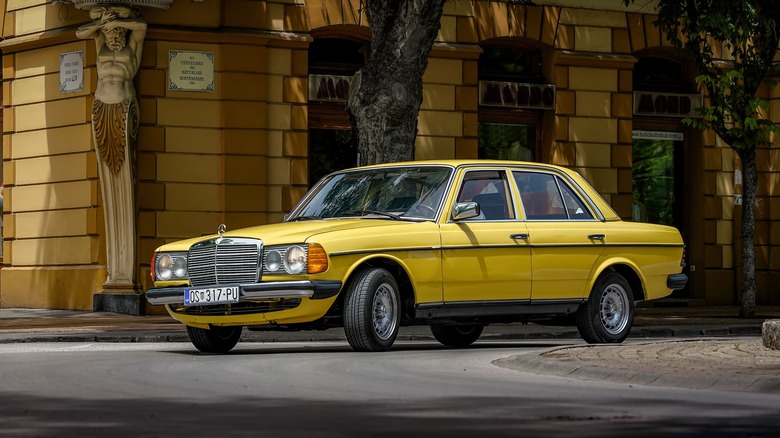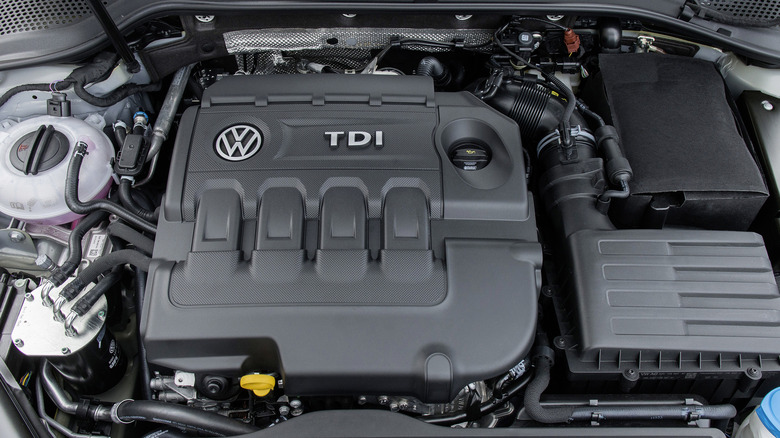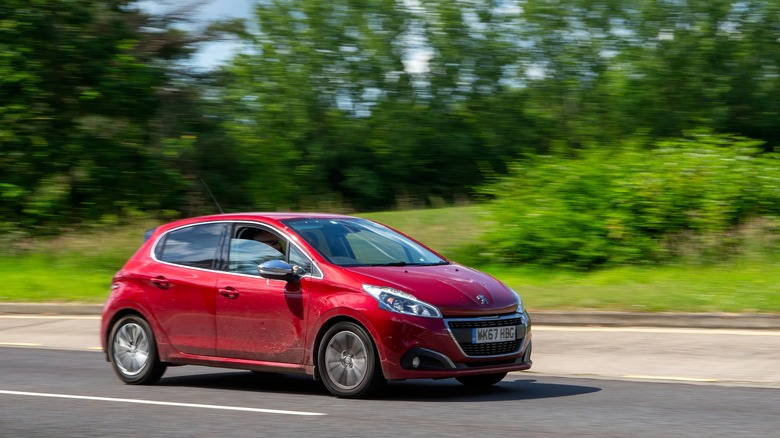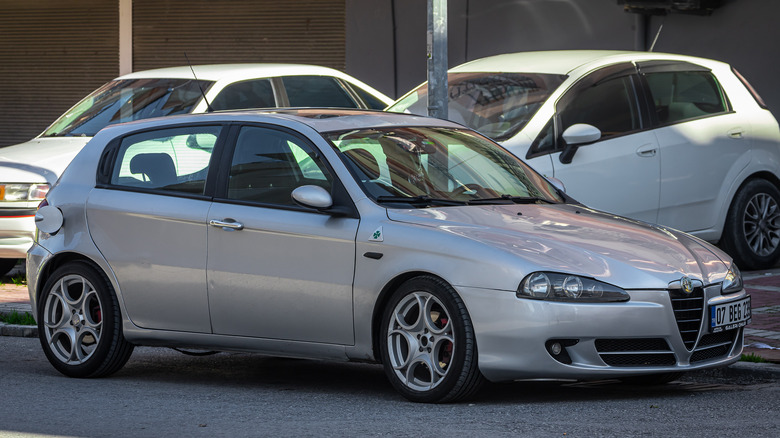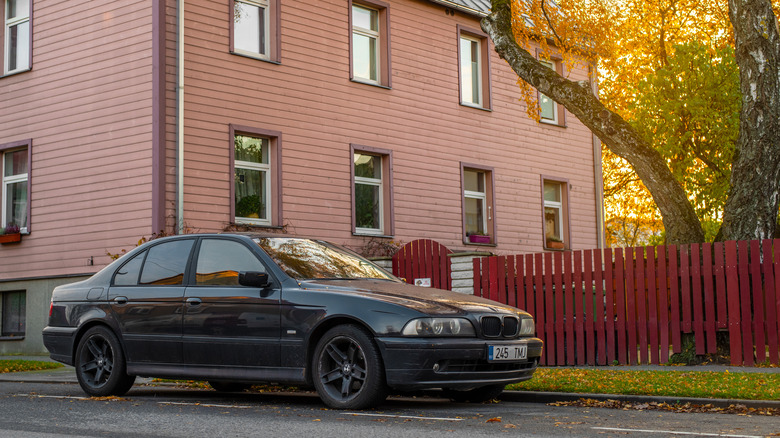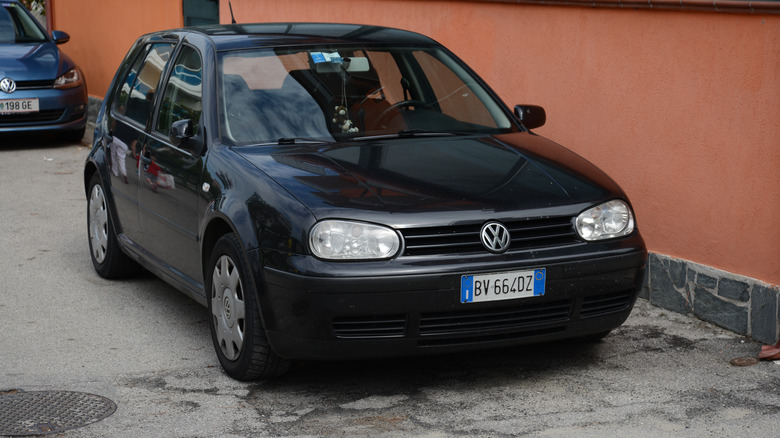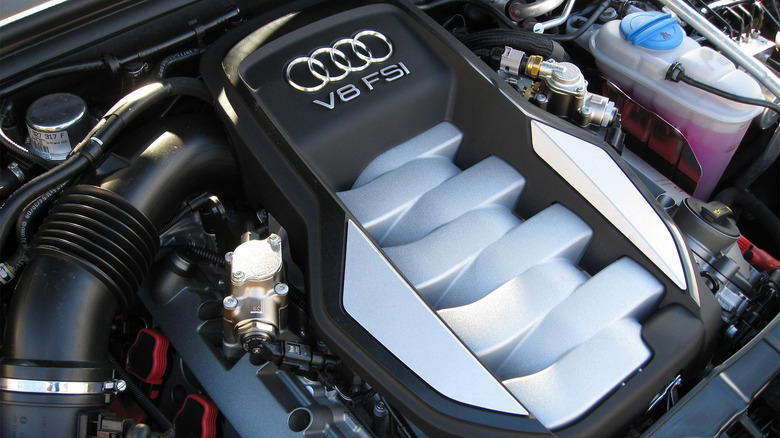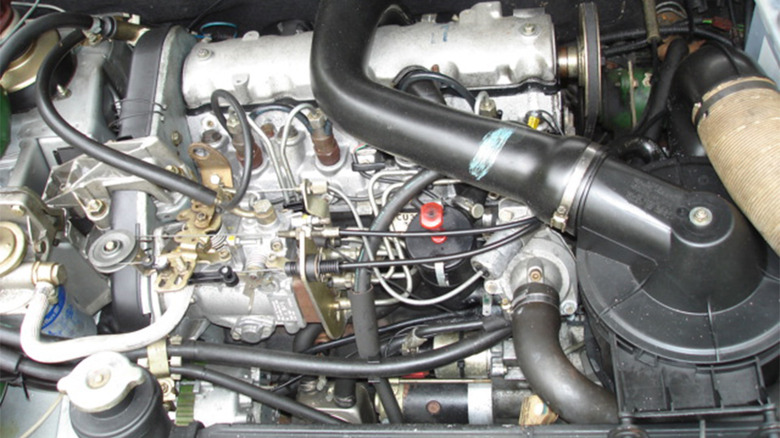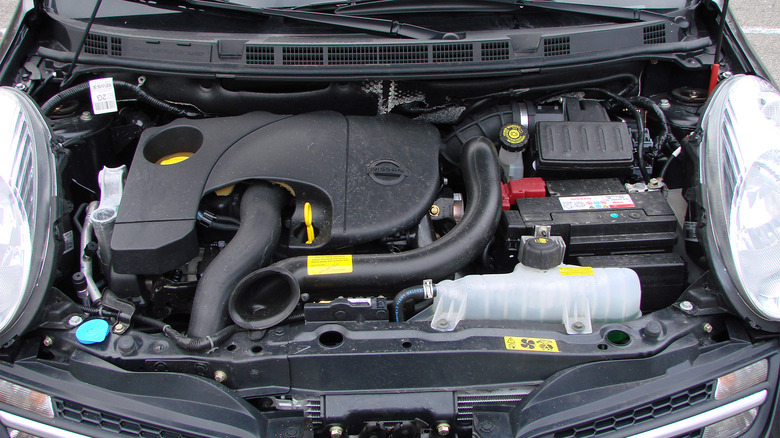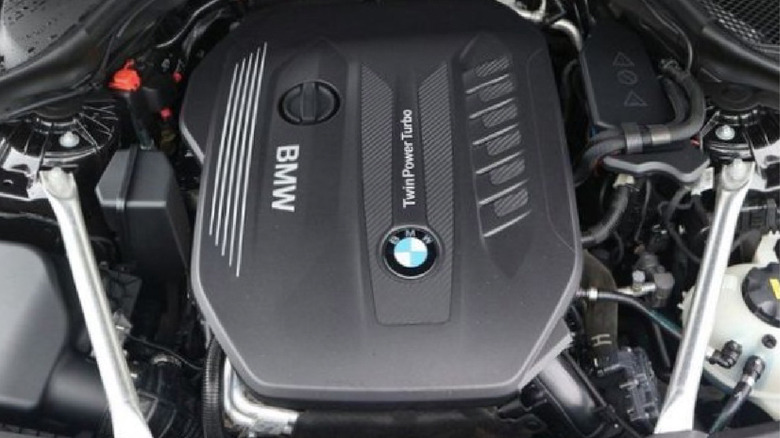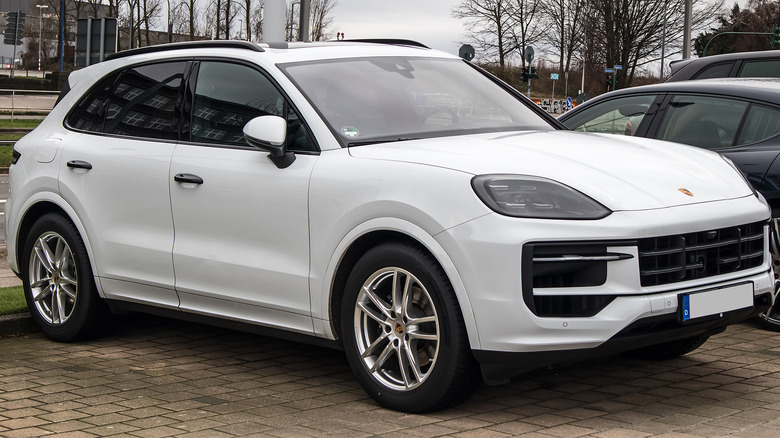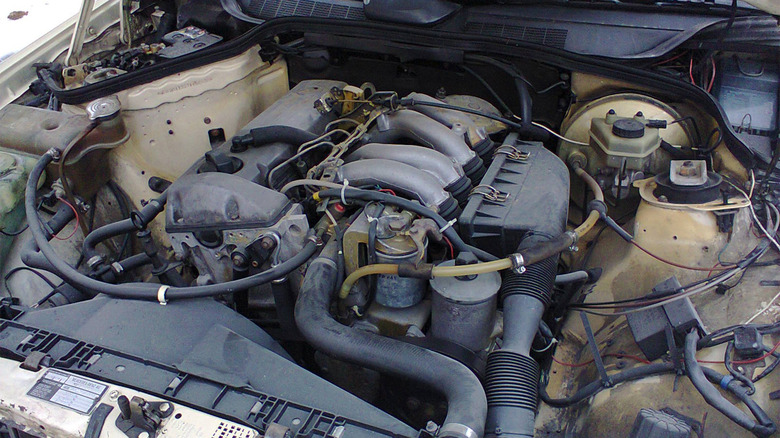The 15 Best Diesel Engines Ever Made By European Automakers
After Rudolf Diesel started a revolution in the world of the internal combustion engine with his self-titled engine technology, the automotive world took a little while to catch up. Eventually, we started seeing diesel engines crop up in any and all manner of passenger vehicles. Even American automakers gave the diesel engine a hand, though the idea that the results were wildly unsuccessful would be quite the understatement. However, North America went on to embrace diesels to a certain extent.
If there's any region of the world that loves the diesel engine and knows how to put one together, it's Europe. European diesel engines are some of the best on offer, due to their mostly excellent dependability and strong performance. As someone who grew up with all kinds of different diesel cars, I've seen some of the best and some of the worst.
Not all European diesel engines are created equal, and some are less reliable than others (looking at you, Jaguar-Ford-PSA AJD). However, for every stinker, there was a standout engine. Throughout the years, European automakers have put together some of the finest oil burners the automotive world has ever seen.
Mercedes OM646
Before the vintage Mercedes owners chime in and explain that the OM617 five-cylinder is the best diesel engine since sliced bread, let me explain. The OM646 is pretty uncommon in North America, but in Europe, it's one of the most common Mercedes powertrains. In Eastern Europe, you're very likely to find a 15-year-old Mercedes taxi carrying the 220 CDI badge on the back, and that means we're talking about the OM646.
The 2.1-liter four-cylinder diesel first appeared in 2002, and as mentioned previously, it has found itself on any and all manner of three-pointed star vehicles that have a 220 CDI badge. As the C implies, it's a common rail design, and all of them had turbochargers.
Thanks to the smaller displacement, cylinder count, and overall much simpler design, the OM646 is a surprisingly dependable powertrain. Those aforementioned taxis in Eastern Europe? They frequently cross 300,000 miles and still chug along like new. This just goes to show that not everything that came out of Mercedes in the 2000s is a ticking time bomb.
Volvo 2.4D / D5
If there's any manufacturer we can thank for making us fall in love with the inline-five cylinder, besides Audi, it's Volvo. Before Volvo was occupied with building electric crossovers with sub-four-second 0-60 times like the EX30, the five-cylinder Modular engine has gone on to define Volvo models for a lot of people. It's one of their signature traits, similar to the 2JZ in the much loved Toyota Supra.
2001 saw the release of Volvo's diesel five-cylinder, displacing 2.4 liters. This engine went on to power another decade and a half of Volvo models, and it found a home in literally every single model that was a part of the lineup between 2001 and 2014.
Like almost all of Volvo's well-known engines, the D5 is completely bulletproof. While not as commonly seen as a taxicab in Eastern Europe, I've personally spoken to a cabbie with a D5-powered V70. The car had well over 310,000 miles and it was still pushing. In fact, it's very difficult to find a D5-powered Volvo with less than 250,000 miles, because they just refuse to die. Frankly, it's a huge shame this powertrain never came to North America.
PSA DW10 2.0 HDI
Hear that? That's the sound of all the haters and the German car lovers making fun of French cars and how unreliable they are. I will admit that French cars are perhaps a little too well-known in the electrical department for having notoriously faulty and short-lasting electronics. However, the French have also made some cracking powertrains, especially those of the diesel variety. Nowhere is this more apparent than in the PSA Group's DW10 2.0-liter HDI diesel.
The engine displaces 2.0 liters and comes in a variety of tunes. It made an appearance in a variety of vehicles carrying Peugeot and Citroën badges. As it turns out, if you take care of this engine, it'll last way longer than you might expect.
300,000 miles is easily possible if you take care of it properly, and some PSA Group vehicles have exceeded this mileage considerably. As long as you take proper care of your DW10, and, for your own sanity, the electronics as much as possible, the DW10 will last a very, very long time. Just try to avoid the automatics, as they can ruin everything (writing from experience here).
Mercedes OM617
All the vintage Mercedes lovers can now breathe a collective sigh of relief as it's time we talked about one of their favorite engines in the three-pointed star's history. The OM617 is a 3.0-liter inline-five diesel that first appeared in the late '70s. It was available with or without a turbocharger, and to this day, it remains one of the only five-cylinder engines that Mercedes has ever made.
The OM617 is so special and well-known for its reliability that it's one of the many things people think of when they think of an engine or a car that is impossible to kill. No matter what you do with the OM617, how much power you squeeze out of it, or how you drive it, it'll just keep going. It's also one of the only automotive engines in history that has the distinctive ability to cross seven-figure mileages with relative ease. It's one of the many reasons why Mercedes of this vintage are so popular in and around the Balkans.
It's also very easy to squeeze extra power out of it, as we've seen plenty of times on the internet, and again, it still can't be touched. If discussing this era of Mercedes, practically all their engines were bulletproof. However, the OM617 added more layers of bulletproofing for one of the ultimate historic diesel engines. If you fancy a classic Mercedes, just get one of these.
Volkswagen EA189 (2.0 TDI 150)
As well as the famous 1.9 TDI (we'll get to that), Volkswagen also released a 2.0-liter TDI in the late 2000s, putting out 140 horsepower. While the eight-volt version is pretty solid, the 16-volt had quite a few issues, per my conversations with an independent Volkswagen expert. Volkswagen set out to iron out all these issues in time for the MQB platform cars of the early 2010s, resulting in the EA189 diesel.
Like the preceding one, the EA189 is also a 2.0-liter unit with a turbocharger (sometimes two), and it puts out 150 horsepower in most forms. In a lot of ways, it was similar to the previous 140 horsepower version, but all of the major issues of the 140 horsepower unit were ironed out, resulting in one of the best modern engines to come out of the VW group.
These units are known to pass 200,000 miles with no real issues and still behave like new even after some good miles on them. Skoda Superbs with this engine are very popular as taxicabs all around Europe, and for good reason. If you take care of it, it will return the favor. It's just a shame the effects of Volkswagen's emissions cheating scandal are still being felt today.
PSA 1.6 BlueHDI / e-HDI
Don't be confused by the name; the 1.6 turbodiesel from the PSA Group did not include any sort of electrification or mild hybrid component. The 1.6 was offered in the group's larger vehicles, but it was primarily intended for all the compacts and subcompacts. The Peugeot 207, the Citroen C4, the Peugeot 208, that kind of thing.
This engine makes anywhere from 90 to 116 horsepower, and it's one of the finest examples of diesel engines to come from the French. Peugeots and Citroens with this engine are very common around most of parts Europe, and with the proper care, they can last forever. This is further proven by the fact that it's one of the most popular engines for the group's small commercial vehicles like the Peugeot Partner and Citroën Berlingo.
One reliability asterisk to look out for with the e-HDI are the oil leaks, as well as the DPF system in the later models, though the latter is common with most modern diesels. Still, the 1.6 HDI is a, pardon the pun, tour de force for such a small, not very powerful engine.
Fiat / Alfa Romeo 1.9 JTD
Yep, we're going there. Fiat and Alfa Romeo are almost always mentioned when the time comes to discuss unreliable cars and engines, right up there with Land Rover and a few Fords here and there. Aside from the amazing Busso, it's true, the Italians did make a few stinkers in their time, but there was one almighty diesel that stood out above the rest: the 1.9 JTD.
JTD stands for Jet Turbo Diesel, "jet" being what the Italians call direct injection. Various different vehicles from the Fiat umbrella ended up receiving this engine, including the Punto, the Stilo, the Kinder egg-shaped Croma wagon, and some Alfa stuff like the 147, 156, and 159. Even the Brera.
To put the dependability of the engine into perspective, here's a quick story: A few years ago, I hitched a ride in an Alfa 156 taxicab. Needless to say, I couldn't help but question the driver on his decision. To say that I was surprised to hear that the 1.9 JTD in his particular 156 is practically bulletproof definitely surprised me. Indeed, 1.9 JTD powered Fiats and Alfas, especially those that have been well-maintained, are still kicking even today. Just be careful of the DPF issues in the later cars.
BMW M57
While it is sometimes fun to mock BMW engines for all the check engine lights, oil leaks, VANOSS systems, and all the other issues they're infamous for, they're not all like that. Sometimes, when the Bavarians can make a super reliable powertrain. This is evident in the M57 diesel.
The M57 made its debut in the late 90s, and it went on to feature in a good handful of BMW models of the time, from the E39 5 Series to the first generation X5. Amazingly enough, BMW was able to keep it going until 2013. While it started out with 148 horsepower, later versions have up to 282 horsepower.
While most BMW experts tend to warn potential buyers of known issues with the powertrains, the M57 is pretty trouble-free in comparison. It does require regular and scheduled maintenance, but if you take care of that, it's a super reliable powertrain that will last way longer than any other BMW engine is known to last. If you take care of the maintenance properly, you might also prevent common old diesel issues like clogged injectors and bad turbochargers. It's a shame this powertrain wasn't really common in North America, but swapping is always an option. It's actually reliable enough to be one of the go-to powertrains to swap into the notoriously unreliable Land Rover Defender.
Volkswagen 1.9 TDI
It's finally time. You didn't think I'd forget one of the most sought-after diesel engines in the automotive world, did you? The 1.9-liter TDI turbodiesel I4 made its debut in the '90s, and it went on to appear in just about everything under the VW umbrella right up until 2010 or so: Golfs, Passats, Jettas, and also Superbs, A3s, Leons, Octavias, and pretty much everything else you can think of.
The 1.9 TDI lineage is split into two parts: the A-series, which are considered the most reliable and were used from the '90s to the early '00s, and the B-series, which first appeared in the mid-'00s. While the B-series 1.9 TDIs are excellent in their own right, the A-series are the preferred ones.
It doesn't matter what time of year it is or what temperature it is outside. It doesn't matter how many miles and how clogged or dirty the injectors are. It doesn't matter how high quality or low quality the fuel itself is. The 1.9 TDI will just keep going and going and going, and it's one of the best-known automotive engines that can crack seven figure mileages, as well as one of the only diesels that can start up in below freezing temperatures with no real issues. Having personally owned and daily driven a 1.9 TDI, with good care, it'll never, ever let you down.
Audi 4.2-Liter TDI V8
Once upon a time, Audi made a 4.0-liter turbodiesel V8. It was a decent overall engine but gained a reputation for being a little temperamental. In 2005, Audi replaced the 4.0-liter with its 4.2-liter TDI V8. Audi would continue to make this engine for only four years, ceasing in 2009. Audi used it in the A4 and Q7 during its relatively short life. It also lent out the engine to Volkswagen, where it was put into the Marine TDI 350-8, and Porsche, where it was stashed in the Cayenne.
This turbodiesel was anything but a quiet, unassuming engine. At the peak of its powers, it made up to 349 horsepower and 590 lb.-ft of torque, making it one of the fastest and more desirable diesel engines ever made. Pair that with all-wheel drive, and you had some pretty quick Audi models in the 2000s. The downside, of course, was fuel economy. Audis equipped with the 4.2-liter received unimpressive fuel economy numbers, averaging around 14-18 MPG, depending on use.
Like most engines, the 4.2-liter V8 did need some regular maintenance to keep its longevity, but with it, you got to keep your powerful V8 turbodiesel for a long time. There aren't too many examples of people bragging about high-mileage engines, but we were able to find folks who put up 75,000 miles per year on it without issues. It certainly fares better than the Audi 3.0-liter TDI V6, which is one of the worst diesel engines ever made.
Peugeot XUD engines
The Peugeot XUD family of engines has a rich, but unassuming, history. It's built by PSA-Peugeot in collaboration with Citroën with some input from Ford, and the engines are featured heavily in vehicles by both brands. The engines come in several flavors, including a 1.8-liter, 1.9-liter, and 2.1-liter option, each with naturally aspirated and turbo options. Each engine is named for its size, with the 1.8-liter is the XUD7, the 1.9-liter is the XUD9, and the 2.1-liter is the XUD11.
All three of these engines are considered quite reliable. In fact, some folks out there think that these little engines sneak into the conversation of being among the most reliable diesel engines of all time, and we fit into that category. It also had a long, long life, with the XUD series lasting from the early 1980s through the early 2000s. There are still examples of this engine in the wild today. We couldn't find confirmation, but there are stories of these engines still driving with over a million miles.
In terms of power, these engines were more economical than powerful. The XUD11 only barely eclipsed 100 horsepower, with users reporting that they can get north of 30 MPG with the engine. That's not bad for an engine that old. The engine was put into many cars over the years thanks to its long lifespan, and with examples still on the road today, it's earned its reputation for reliability.
Renault K9K 1.5 dCi
Renault's K9K 1.5 dCi is very similar to the story of the Peugeot XUD engine family. Renault started making the engine in 2001 and still produces K-type engines to this day, although word is that they're going to phase out diesel engines due to emissions standards. Over the years, the trusty 1.5-liter dCi has been added to dozens of cars, including from automakers like Nissan. You won't see examples here in the States since economy diesels aren't the most popular here, but the Nissan Qashqai exists, and it features the Renault 1.5-liter dCi. You can find this engine pretty readily in Europe and Asia.
One of the reasons for that is that the engine is considered highly reliable. Official reliability metrics don't exist for the engine, but it remains a common recommendation for people shopping for an economical diesel. There are at least six variants of the engine, and we couldn't find any bad words about any of them. The range includes the 884, 796, 636, 837, 846, and 836. You'll most commonly find it in the Renault Megane, Laguna, Kangoo, Clio, and Duster, along with the aforementioned Nissan Qashqai and non-U.S. versions of the Nissan Juke.
It's an inline turbo-four that can put out up to 110 horsepower, and up to 180 lb.-ft of torque, although most versions of the engine do less than that, and many do less than 100 horsepower. Like the Peugeot XUD, this is another example of a small, unassuming engine that seems to run forever.
BMW B57
In the early 2000s, BMW was in a war with Audi and Mercedes-Benz. The goal? To make larger, more powerful turbodiesel engines that put out tons of horsepower and torque for their power-hungry customers. The war has long since ended, with the winner being the customer, but BMW remains one of the automakers that still leans on the diesel engine to this day. One of its more modern engines is the B57. BMW started making the 3.0-liter straight-six in 2015, and as far as we can tell, BMW still puts this engine in many of its vehicles today.
Being a modern engine has its perks. Not only is this thing wicked fast, putting up to 335 horsepower on the road in its most powerful configurations, but it's exceedingly fuel efficient. It's rated to get somewhere between 31 and 43 MPG, with some folks reporting that they've been able to goose over 60 MPG out of it with all highway driving. Thanks to its mix of solid performance and fuel economy, the B57 is considered one of the better all-around engines that BMW makes.
In terms of reliability, BMW diesels are having a good time with public opinion. Not only is the B57 considered highly reliable, but its cousin, the B58, is as well. There are some things you'll want to replace a couple of times over the engine's life, but otherwise, there doesn't seem to be a fatal common issue that would preclude this engine from being on the list.
Porsche 958 Diesel
Porsche is an interesting brand when it comes to engines. It can make its own but often borrows from other brands. For example, there are Porsche vehicles out there with both Audi and Volkswagen engines, and both of those automakers share engines with one another as well. In general, Porsche is quite well regarded no matter which engine the automaker goes with. However, sometimes, Porsche puts up one of its own engines and it's a special engine. One such example is the Porsche 958 Diesel, a V6 twin-turbo diesel.
The Porsche 958 Diesel is a story of two engines. Porsche made it from 2011 through 2018. The first generation was known as the 958.1, and it was made from 2011 to 2015. Porsche then made some changes to the engine for the 958.2, which lasted from 2015 until the engine was discontinued in 2018. Both engines are well regarded for their reliability, but most give the win to the second generation thanks to its additional refinement. Notably, the Porsche Cayenne with the 958.1 came with a manual, while all 958.2 models came with an automatic transmission.
The engine may well have lasted much longer, but it was not to be. Volkswagen's Dieselgate scandal caused a lot of consumer pushback, and since Volkswagen owns Porsche, both brands were affected by the backlash. Thus, Porsche lost its diesel engine in 2018, and while it may have cheated on emissions tests, it still ran forever if treated right.
Mercedes-Benz OM601-OM606
Mercedes-Benz has been making diesel engines for a very long time. In fact, the luxury automaker made the first diesel-powered passenger car in 1936 and have been using diesel engines ever since. With that much experience in the craft, it makes sense that Mercedes has made a ton of reliable diesel engines over the years. To keep this article from being too heavy on Mercedes, we'll group up a family of engines that Mercedes made all at the same time: Say hello to the OM601, OM602, OM603, OM604, OM605, and OM606.
The history here is quite immense, so let's break it down. The OM601 was a naturally aspirated inline-four with a single overhead cam that was eventually replaced by the OM604, another inline-four with turbo and a double overhead cam. The addition of turbo and DOHC is the same for the other two sets of engines. That means the OM602 was an inline-five replaced by the OM605, which had turbo and DOHC. Finally, the OM603 was an inline-six that was replaced by the OM606 that included a turbo and DOHC.
The addition of turbos and DOHC means that those engines are the most powerful of the six. However, it did nothing when it comes to reliability. All six engines are considered exceptionally reliable, no matter which one you look at. The newest engines were made in 2001, the year Mercedes stopped producing the in favor of the now-legendary OM617. Sadly, none of these engines were released in the U.S.
